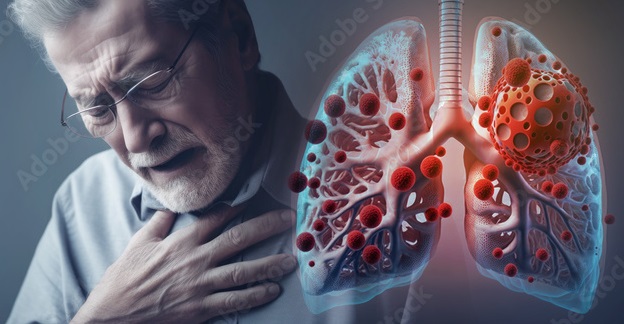Lung cancer can be a scary word, but recognizing its early signs can make a huge difference. If you’ve been feeling off lately, it’s important to listen to your body and not ignore symptoms, even if they seem minor. Here’s a look at some symptoms that could be linked to lung cancer, and why you shouldn’t brush them off.
Signs of Lung Cancer
Here are some key symptoms of lung cancer that you should never ignore:
1. Persistent Cough:
If you’ve had a nagging cough that just won’t go away, or if it’s starting to sound different—like it’s producing blood or strange-colored mucus—it’s worth getting checked out. Sometimes, a persistent cough can be more than just a lingering cold.
2. Shortness of Breath:
Feeling out of breath more than usual, or finding it hard to catch your breath even when you’re not exerting yourself, might be a sign that something’s wrong. If you notice this happening regularly, it’s time to see a doctor.
3. Chest Pain:
A dull ache or sharp pain in your chest that doesn’t seem to get better with time or seems to get worse with coughing and deep breaths could be a red flag. Don’t ignore persistent chest pain, especially if it’s accompanied by other symptoms.
4. Unexpected Weight Loss:
Dropping pounds without trying, especially if you’re not changing your diet or exercise routine, can be a symptom of something more serious. If you’re losing weight and you don’t know why, it’s a good idea to check in with your healthcare provider.
5. Fatigue:
We all get tired, but if you’re feeling exhausted all the time, no matter how much you rest, it could be a sign of a bigger issue. Lung cancer can sap your energy, so if you’re feeling unusually worn out, don’t ignore it.
6. Hoarseness:
If your voice has become hoarse or raspy and it’s not getting better, it could be worth investigating. Sometimes, changes in your voice can be linked to problems in the lungs or throat.
7. Recurrent Infections:
Catching colds, bronchitis, or pneumonia more often than usual might suggest something’s obstructing your airways. If infections keep coming back, it might be time to find out if there’s a deeper issue.
8. Swelling in the Face or Neck
Swelling in your face or neck, especially if it’s new and unexplained, might indicate that something is affecting your lymph nodes or blood flow. This can sometimes be a sign of lung cancer spreading.
9. Clubbing of the Fingers:
Clubbed fingers, where the tips swell and the nails curve around, might not be common but can be a sign of lung issues. If you notice this change, it’s worth mentioning to your doctor.
Why You Shouldn’t Ignore These Symptoms?
Ignoring symptoms, even if they seem minor, can lead to delayed diagnosis and treatment. Lung cancer, particularly in its early stages, might not present obvious signs, and by the time symptoms become noticeable, the disease could be more advanced. Early detection significantly improves the chances of successful treatment and can prevent the cancer from spreading.
If you experience any of the symptoms mentioned above, especially if they persist or worsen, seek medical attention promptly. A healthcare provider can conduct the necessary tests and evaluations to determine the cause of your symptoms and provide appropriate treatment options.
What You Can Do?
1) Get Regular Check-Ups:
If you’re at higher risk—like being a smoker or having a family history of lung cancer—regular check-ups are a smart move. Don’t wait for symptoms to become severe.
2) Be Honest With Your Doctor:
Share all your symptoms, even if they seem minor. What feels like a small issue to you could be a crucial clue for your doctor.
3) Consider a Second Opinion:
If you’re unsure about a diagnosis or treatment plan, getting a second opinion can provide clarity and options you might not have considered.
Conclusion:
Lung cancer is a serious condition, but recognizing its symptoms early can make a significant difference in treatment outcomes. Pay close attention to any persistent or unusual symptoms and consult a healthcare provider without delay. Your health is invaluable, and addressing these signs promptly can lead to better management and improved prognosis. Remember, taking action early is the best way to safeguard your health.
Also Read:
